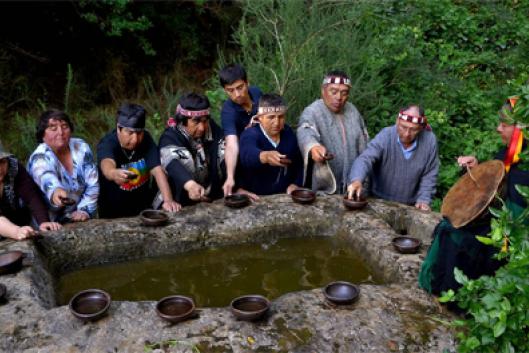The companies Forestal Mininco y Forestal Arauco account for the vast majority of tree plantation activities in Chile, with almost two million hectares of monoculture plantations of exotic tree species, mainly pine and eucalyptus. Despite the resistance, denunciations and harsh criticisms on the part of numerous Mapuche Indigenous organizations and communities, both companies have been certified with the FSC label through foreign consulting firms.
The aim of the Forest Stewardship Council (FSC) is to promote “environmentally appropriate, socially beneficial and economically viable” management of forests worldwide. The FSC certifies wood, paper and other forest products in order to, theoretically, guarantee “sustainable” forest management. In order to receive FSC certification, forestry operators and suppliers must adhere to 10 principles and associated criteria, which include respect for the rights of indigenous peoples. The certification process is carried out by external consultants. In many cases, such as in Chile, these consulting firms have granted the FSC label to companies that have been harshly criticized for their social and environmental impacts.
In recent years, FSC certification has become a standard for the international wood and forest products market. While certification is voluntary, it is practically a requirement for export. For example, the fact that the countries of the European Union demand the FSC label has obliged Chilean forestry companies to comply with its procedures.
Certification that ignores communities and forests: Forestal Mininco and Forestal Arauco
Industrial tree plantations owned by the companies Forestal Mininco and Forestal Arauco are expanding in central-southern Chile, along with numerous pulp mills for paper production. Complaints have been lodged against all of these companies’ pulp mills for severe pollution. The plantations have also generated many social and environmental impacts, particularly impacts on water sources, conflicts with Mapuche Indigenous communities who claim ancestral rights to land under the control of these companies, and the destruction of sacred sites.
In January 2011, the Mapuche Territorial Alliance (Alianza Territorial Mapuche), together with numerous communities, denounced the fact that Forestal Mininco’s FSC-certified area largely overlapped with Mapuche traditional territory. The Alliance stressed that the company does not respect the communities or their territories, and provided evidence of a series of acts of violence and conflicts caused by the company. Meanwhile, in September 2011, the Working Group for Collective Rights (Grupo de Trabajo por Derechos Colectivos) presented evidence of the bad practices of both companies to the FSC-accredited certification bodies SmartWood Program/Rainforest Alliance and Woodmark, urging them not to be complicit in the human rights violations and the serious social, environmental and economic damages and conflicts provoked by the companies. For its part, Forestal Arauco initiated the certification process in 2009, with Woodmark as the certification body. The Association of Engineers for Native Forests (Agrupación de Ingenieros por el Bosque Nativo) declared that, based on the evidence gathered, Forestal Arauco had not complied with the FSC’s principles and criteria.
Nevertheless, both companies were certified. The Rainforest Alliance granted certification for Forestal Mininco’s pine and eucalyptus plantations in 2012, ignoring the long list of land conflicts with Mapuche communities, the numerous denunciations of acts of violence, and even the loss of the Mapuche people’s sacred sites – despite the fact that the Rainforest Alliance had registered some of these sites. Woodmark, meanwhile, had initially rejected Forestal Arauco’s request for certification in 2013, but ended up certifying it in September of the same year.
In January 2014, numerous civil society organizations, residents associations and peasant and indigenous communities filed a challenge to overturn the FSC certification granted to Forestal Arauco. In August of the same year, the Mapuche community Eugenio Araya Huiliñir de Renaico filed for an injunction against Forestal Mininco to halt the work that the company was carrying out in territories currently being reclaimed as ancestral lands. In December, the Mapuche community of Juan Bautista Jineo denounced damages caused by the company to the community’s lands, as a result of plantation activities on the bordering property. That same month, Forestal Arauco was denounced by Mapuche authorities and cultural researchers for the serious impacts of its operations on areas considered sacred and of spiritual importance to the Mapuche people.
Both companies have lobbied the public pillars to militarize and criminalize communities, as well as the application of the anti-terrorism law.
The impacts of industrial plantations and questioning of certification bodies
The FSC is contributing to the expansion of industrial monoculture tree plantations around the world. Numerous different communities and organizations have insistently denounced their many impacts. These include the displacement of native forests; the loss of surface and groundwater resources; the indiscriminate use of pesticides and resulting pollution; the fencing in of rural communities by plantations; the destruction of rural roads and pollution caused by logging trucks and heavy machinery, particularly at harvesting time; the loss of food sovereignty due to the replacement of livestock grazing and agricultural land by tree plantations; the desecration of sacred sites; and rising poverty.
The certification of industrial tree plantations is unacceptable. The FSC presents itself to the world as the most trustworthy and respected label for wood products, particularly since its members include a number of NGOs. Criticism once again points at the fundamental problem of excessive patterns of consumption. If the consumption of paper and paper products is not curbed, it will be difficult to stop the expansion of tree plantations. In Chile, the FSC label continues to spread. It is crucial to expose the contradictions and lies behind the certification process, as well as the objectives of the labels themselves, because they are complicit in the violations of human rights and destructive social and environmental impacts generated by industrial tree plantations.
Article extracted from “El desacreditado sello FSC en Chile a causa de las certificaciones a empresas forestales” by Alfredo Seguel, editor of the Mapuche news agency Mapuexpress,http://www.mapuexpress.org/2014/12/30/el-desacreditado-sello-fsc-en-chile-a-causa-de-las-certificaciones-a-empresas-forestales#sthash.OtGD9Kkj.lqzykeIA.dpuf
